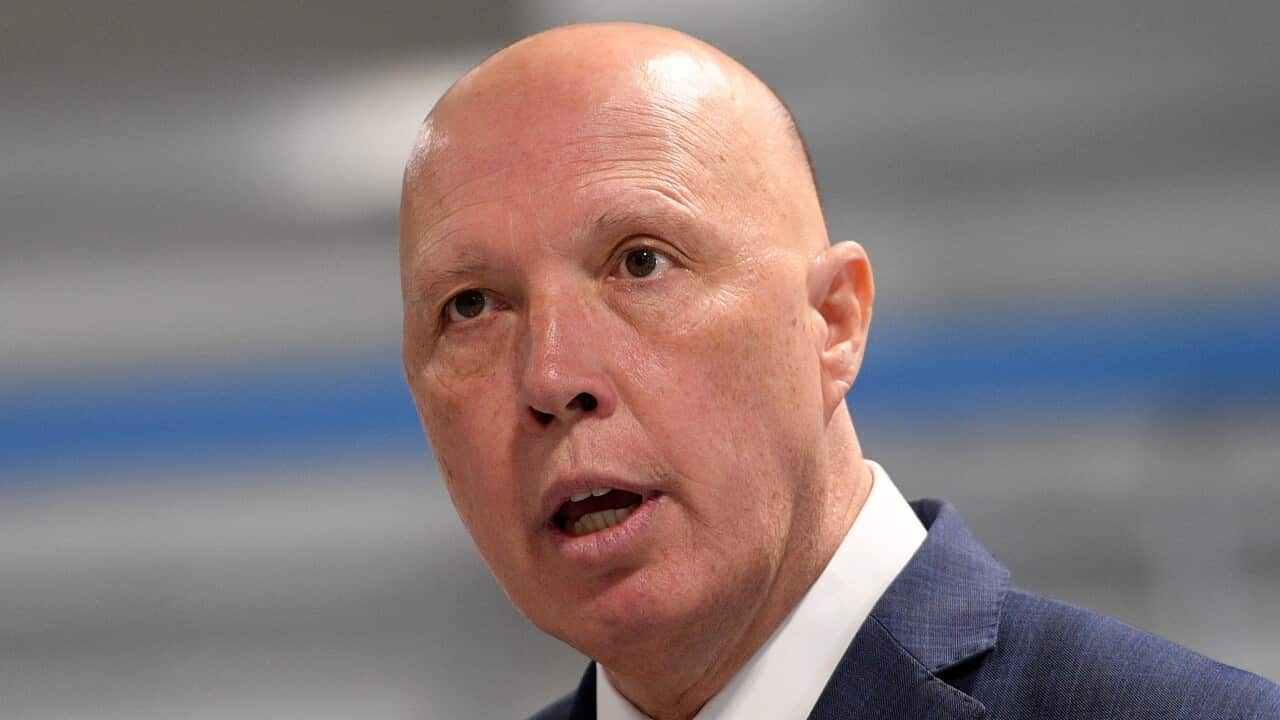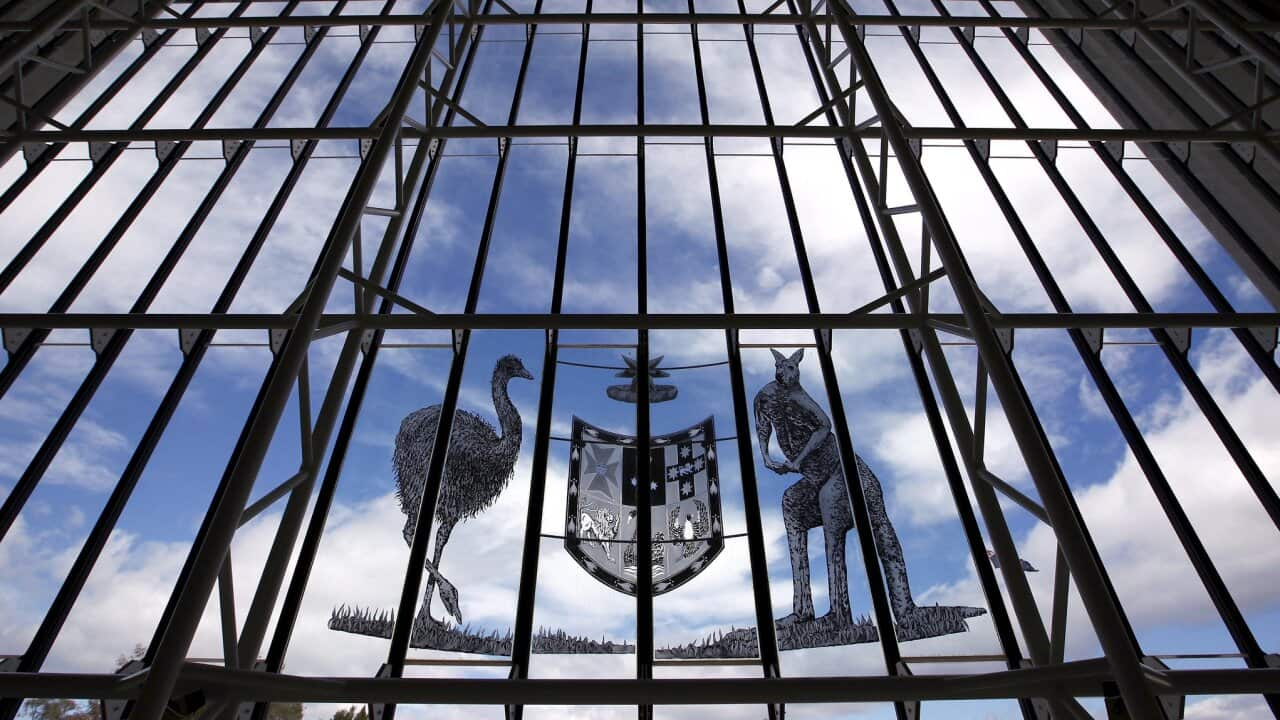Opposition leader Peter Dutton has urged the Labor government to bring forward the start of parliament to fix anti-terrorism laws after a High Court decision overturned powers to strip dual-nationals of Australian citizenship.
The High Court on Wednesday (Cth), which also applies to children aged 14 to 18.
The High Court found that a July 2021 decision by Mr Dutton, then-Morrison government home affairs minister, to strip citizenship from Turkish-Australian man Delil Alexander who was imprisoned in Syria for terrorism offences, was unconstitutional.
The judgement invalidates ministerial powers to revoke a person's citizenship under section 36B of the Australian Citizenship Act 2007, which also applies to children aged 14 to 18.
Mr Alexander, who remains in Syrian security custody without access to his family after his Australian citizenship was removed last year, brought the case to the High Court via his sister. Advocates for Mr Alexander have written to the Albanese government seeking consular assistance.

Attorney-General Mark Dreyfus said there was "no threat to Australia as a result of the decision" by the High Court. Source: AAP / Mick Tsikas
But he noted there was "no threat to Australia as a result of the decision".
"The Australian government has a range of measures available to manage the risk posed to Australians by individuals offshore including the temporary exclusion order regime which can prohibit an individual from returning to Australia for up to two years," he said.
In 2018, the then-Labor opposition questioned the laws when they passed parliament saying they appeared constitutionally invalid - a position backed by legal and human rights groups.
Mr Dutton said the new Albanese government should quickly get legal advice and work out a legislative response.
"(They should) tell us what is available to them by way of legislation and tighten it up as best you can because, if not, there will be dire consequences and that's the last thing that I want to see," Mr Dutton told Sydney radio station 2GB on Thursday.
He said Coalition MPs were willing to come to Canberra earlier than the flagged 26 July starting date of the 47th parliament to pass any amendments.
"If parliament needs to resume next week or the week after, we will be there and we will support that because there is an urgency to this," Mr Dutton said.
"These people will do great harm given the opportunity."
Hope for Australian children trapped in Syria
The High Court decision will better protect the rights of dependent children of suspected foreign fighters charged under Australia's counter-terrorism laws, advocates say.
At least 47 Australian children remain in camps in the Al Hol and Al Roj camps in northeast Syria.
Three of those children are the grandchildren of Sydney-based Kamalle Dabboussy.
He said for years the families of suspected foreign fighters have suffered for the actions they themselves did not commit.
"The suffering is extreme," he told SBS News.
"It's hard to describe, they've been there for so long, anticipating support from the Australian government that hasn't come. They are in a situation which the UN has described as hell on Earth.
"It's a punishing regime. That is day in and day out. They'll go days on without water, they'll have days without food; they try and make do it the best they can of course. There's very little medical help. Children are sick and it's just a torturous situation for them."
Mr Dabboussy said his daughter Mariam was on a family holiday in Turkey in 2015 when she was tricked into crossing the Syrian border at gunpoint.
Mariam's husband reportedly fought for the self-proclaimed Islamic State and died in an airstrike aimed at a training camp.
Mr Dabboussy said it has been incredibly difficult to hear what his daughter and grandchildren have been facing — along with other Australians in the camps.
"No child should have to bear the crimes of their parents - what they may or may not have done. And yet these children have been put through that - have been made to suffer. And I would say my daughter has been made to suffer for things that have been beyond their control," he said.

Kamalle Dabboussy with his daughter, Mariam Dabboussy, and grandchildren in Al-Hol camp in Syria in 2019. Credit: Kamalle Dabboussy
"The ruling shows the Home Affairs Minister can't take on a judicial role - that is it can't make judgments about people in their absence," he said.
"So I would hope there are further implications from this ruling that can be read into it. It underscores as a fact the Australian government has a responsibility to all Australians, wherever they are around the world."
Judges order reinstatement of Australian citizenship
The High Court case was brought by Mr Alexander, 35, who travelled to Turkey in 2013 and then to Syria where he married his wife and where he was accused of being affiliated with terrorist groups, according to the Australian Security Intelligence Organisation (ASIO).
In 2017 Mr Alexander was arrested by Kurdish militia and was sentenced to 15 years' jail by a Syrian court for terrorism-linked offences. The sentence was later reduced to five years.
Mr Alexander's sister, Berivan, who launched the action on his behalf, said Syrian officials subjected her brother to torture before receiving his admission.
He was pardoned in June last year, but the then-home affairs minister Karen Andrews cancelled his citizenship despite classified advice from ASIO that did not recommend citizenship cancellation, the court heard.
Since 2021, Mr Alexander's family or legal team have been unable to locate him as he is believed to be in Syrian intelligence custody.
Government lawyers argued the minister had the discretion to make the decision to cancel Mr Alexander's Australian citizenship.
"The minister's decision ... turns upon both security issues and other issues (such as an assessment of repudiation of allegiance to Australia and the public interest)."
Mr Alexander's solicitor Osman Samin, from Australian Criminal and Family Lawyers, said this was a historic moment in the way in which Australian laws were interpreted.
Mr Alexander has retained his Turkish citizenship and the majority of the full bench of seven High Court judges ruled that his Australian citizenship should be reinstated.
'Welcome step in helping to restore the rights of all Australian children'
Save the Children Australia CEO Mat Tinkler said the court ruling has implications for Australian children who have effectively been left stateless by the Australian government's decision to revoke the Australian citizenship of suspected foreign fighters.
"We’re aware of cases where decisions by the Australian Government to revoke an adult’s citizenship have effectively left children stateless," he said.
"Both these innocent dependents – as well as any children accused or convicted of criminal activity – have the fundamental right to retain their Australian citizenship.
"The UN Committee on the Rights of the Child has been clear. States may not deprive a child of his or her nationality on any ground, regardless of the status of his or her parents.
"Today's court ruling is a welcome step in helping to restore the rights of all Australian children."
'Due for action'
In 2019, the UN Committee on the Rights of the Child urged the Australian government to revoke the amendments to the Citizenship Act allowing for children under 18 years of age to lose their Australian citizenship if they were caught under laws on foreign fighting or terrorism-related conduct.
Mr Dabboussy said globally, pressure has been growing for Western nations to repatriate families of foreign fighters.
"The United Nations has said that the rights of these women and children have been obliterated by the lack of [Australian] government action. So it was it was due for action one way or the other. I do hope they take a more compassionate and a quicker resolution to this particular issue," he said.
"These children cannot spend the rest of their lives in this hopeless situation, leaving them at risk of trafficking, slavery or extremism. The Australian government needs to stand up and to and to look after its own children."

The Kurdish-run al-Hol camp, which holds relatives of suspected IS group fighters in the northeastern Hasakeh governorate, on 6 December 2021. Source: Getty / DELIL SOULEIMAN/AFP via Getty Images
Offers of assistance from US and the Kurdish authorities to extricate the women and children from the camps have so far been rebuffed.
"The government's policy on repatriation is predicated on the protection of Australians and the Australian community. It looks at repatriation on a case-by-case basis," Australia's Ambassador for Counter-Terrorism Roger Noble told the foreign affairs parliamentary committee on 4 June 2021.
With AAP.




